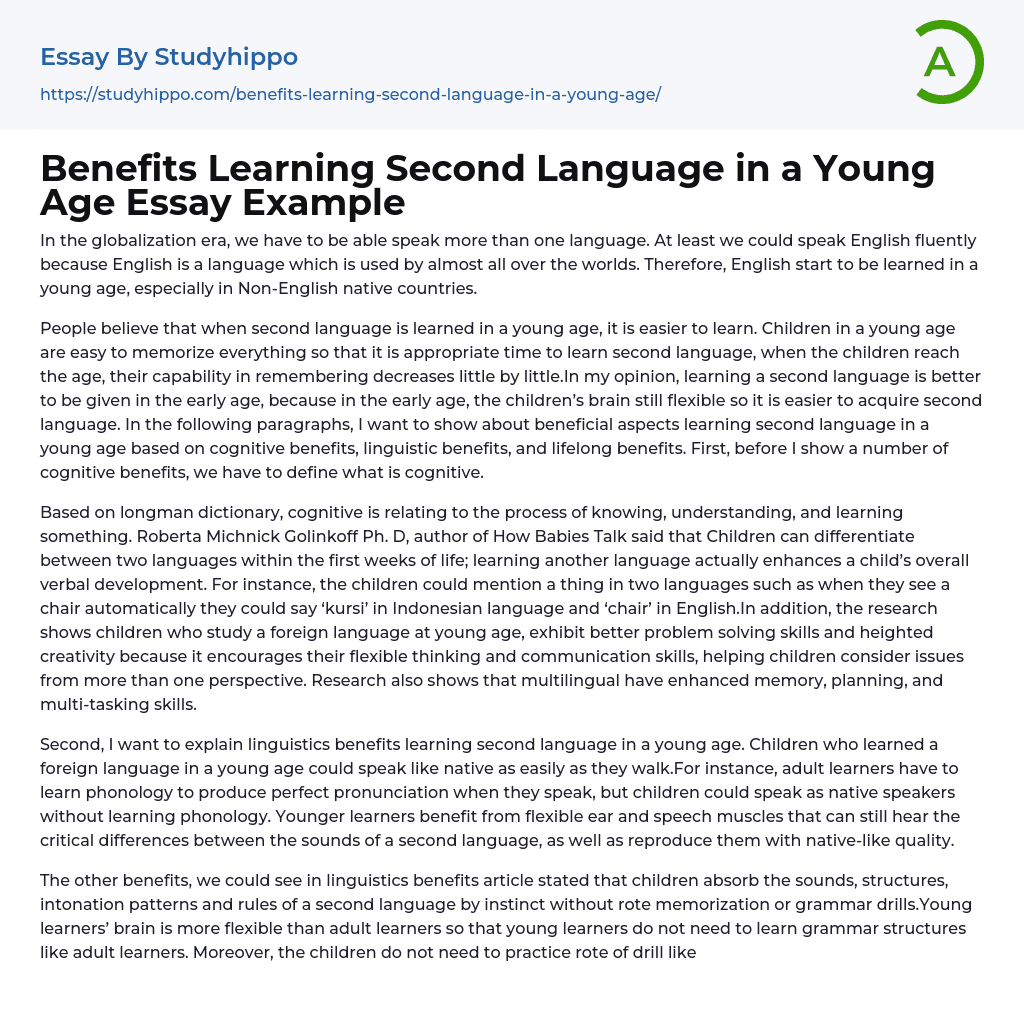

Benefits Learning Second Language in a Young Age Essay Example
In the globalization era, we have to be able speak more than one language. At least we could speak English fluently because English is a language which is used by almost all over the worlds. Therefore, English start to be learned in a young age, especially in Non-English native countries.
People believe that when second language is learned in a young age, it is easier to learn. Children in a young age are easy to memorize everything so that it is appropriate time to learn second language, when the children reach the age, their capability in remembering decreases little by little.In my opinion, learning a second language is better to be given in the early age, because in the early age, the children’s brain still flexible so it is easier to acquire second language. In the following paragraphs, I want to show about beneficial aspects learning
...second language in a young age based on cognitive benefits, linguistic benefits, and lifelong benefits. First, before I show a number of cognitive benefits, we have to define what is cognitive.
Based on longman dictionary, cognitive is relating to the process of knowing, understanding, and learning something. Roberta Michnick Golinkoff Ph. D, author of How Babies Talk said that Children can differentiate between two languages within the first weeks of life; learning another language actually enhances a child’s overall verbal development. For instance, the children could mention a thing in two languages such as when they see a chair automatically they could say ‘kursi’ in Indonesian language and ‘chair’ in English.In addition, the research shows children who study a foreign language at young age, exhibit better problem solving skills and
heighted creativity because it encourages their flexible thinking and communication skills, helping children consider issues from more than one perspective. Research also shows that multilingual have enhanced memory, planning, and multi-tasking skills.
Second, I want to explain linguistics benefits learning second language in a young age. Children who learned a foreign language in a young age could speak like native as easily as they walk.For instance, adult learners have to learn phonology to produce perfect pronunciation when they speak, but children could speak as native speakers without learning phonology. Younger learners benefit from flexible ear and speech muscles that can still hear the critical differences between the sounds of a second language, as well as reproduce them with native-like quality.
The other benefits, we could see in linguistics benefits article stated that children absorb the sounds, structures, intonation patterns and rules of a second language by instinct without rote memorization or grammar drills.Young learners’ brain is more flexible than adult learners so that young learners do not need to learn grammar structures like adult learners. Moreover, the children do not need to practice rote of drill like adult learners because they acquire second language naturally. Third is the last advantages based on lifelong benefits. When the children learn a foreign language in the early age, they will have a strong basis about their second language.
Therefore, they have ability to learn additional languages more easily. Adding a third language will not confuse the children.In fact, adding a third language will enhance their skills in all languages. For example, when the children being mastered in English, they will be able learn other languages such as Germany,
Dutch, French more easily than they who do not mastered in English. They could learn these languages more easily because some French vocabularies are also in English although it little bit different in writing and pronunciation. Moreover, it increases their curiosity to learn about the culture where their second or third language originates from, so that it can expand world view.
Next, they will be greater intercultural appreciation and sensitivity. Look ahead 20 years or so…imagine the social and career opportunities that will be available to your child if they can speak three languages! Finally, based on cognitive benefits we know that children who learn a language young go on to enhances a child’s overall verbal development, exhibit better problem solving skills and heighted creativity, and multilingual have enhanced memory, planning, and multi-tasking skills.Next, we see through linguistics benefits, children could speak like native as easily as they walk. Last, for lifelong benefits, they will become open minded, easy to learn additional languages, and will be greater intercultural appreciation and sensitivity.
Therefore, learning second language is beneficial from many aspects. By looking at the benefits learning second language in a young age, parents should not postpone to encourage their children in learning second or third language in the early age for their better future.
- Interpretation essays
- Plagiarism essays
- Analogy essays
- Learning English essays
- French Language essays
- Language Education essays
- Second Language Acquisition essays
- Teaching English As A Foreign Language essays
- Verb essays
- Dialect essays
- English Language essays
- Second Language essays
- Semiotics essays
- Sign Language essays
- Spanish Language essays
- Coaching essays
- Critical Thinking essays
- homework essays
- Learning essays
- Library essays
- Listening essays
- Literacy essays
- Mentor essays
- Physical Education essays
- Project essays
- Reading essays
- Research essays
- Sex Education essays
- Social Studies essays
- Standardized Testing essays
- Study Plan essays
- Teaching essays



